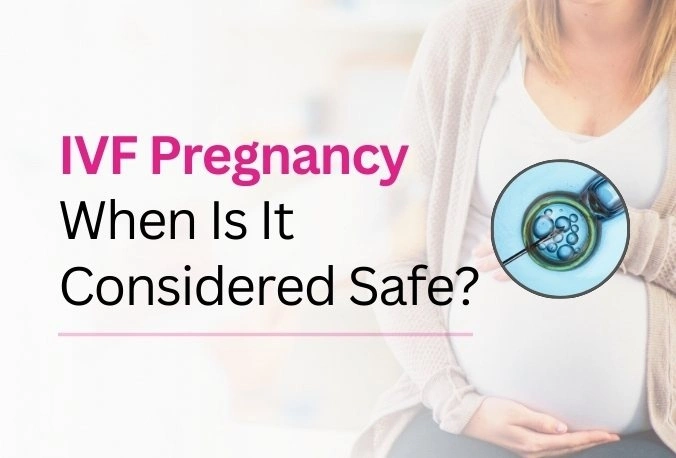After how many weeks the IVF pregnancy Is safe?
– Published on 24 Feb 2024

IVF pregnancies, much like natural conceptions, carry a level of inherent risk, particularly in the early stages. Although many would consider the pregnancy to be ‘safe’ after the first trimester (approximately 12 weeks), it is crucial to note that each pregnancy, IVF or otherwise, is unique.
Factors such as maternal age, health, and any pre-existing conditions can alter the timeline of when a pregnancy may be deemed ‘safe’. Regular check-ups with obstretrician and following their prescribed advice can help manage these risks.
However, it’s important to understand that the term ‘safe’ does not guarantee a risk-free pregnancy, but rather signifies a significantly reduced risk of complications.
Are you trying to conceive but facing challenges along the way? Dr. Samidha Dalvi-Amale,Best IVF Doctor in Pimple Saudagar, Pune and her compassionate team are here to guide you on your journey to parenthood with personalized IVF treatments. Don’t wait any longer to turn your dreams into reality
Factors that influence IVF pregnancy risk in early weeks
During the early weeks of IVF pregnancy, several factors can significantly influence the associated risk. One key factor is the quality and number of embryos transferred. Higher quality embryos and a conservative number of embryos transferred can reduce the risk of complications such as multiple births.
Another critical factor is the age of the woman undergoing IVF treatment. Women above the age of 35 have a higher risk of miscarriage, gestational diabetes, and pre-eclampsia.
Pre-existing medical conditions, such as obesity and diabetes, can also increase the risk of complications in the early weeks of an IVF pregnancy.
The use of donor eggs, particularly if the donor is young and healthy, can often reduce some of these risks.
Lastly, lifestyle choices such as smoking, alcohol, and high levels of caffeine can negatively impact the early weeks of an IVF pregnancy. Therefore, maintaining a healthy lifestyle is highly recommended.
Must Read: How IVF procedure is carried out?
Risk Reduction After Key Milestones
The risk of miscarriage in pregnancies, including IVF, decreases significantly after certain milestones. By the end of the first trimester (week 12), the risk drops dramatically as the major organs of the foetus have formed. This period is often considered a major milestone because the baby’s genetic makeup is complete and the risk of genetic abnormalities triggering a miscarriage decreases.
The 20-week mark is another important milestone. At this point, the risk of miscarriage falls to as low as 2%, signifying a considerably safe period in the pregnancy. However, it’s worth remembering that while reaching these milestones does lower the risk, they do not eliminate it entirely.
Continuous care and regular check-ups remain integral throughout the entire pregnancy to ensure the health and well-being of both the mother and the baby. Regular ultrasound scans and antenatal tests are recommended to monitor the pregnancy’s progress and promptly address any potential issues.
Close monitoring in second trimester
The second trimester, often dubbed as the ‘golden period’ of pregnancy, is a time of rapid growth and development for the baby, and it is also a period when the mother can start to feel more relaxed and enjoy her pregnancy.
However, it is critical to maintain close monitoring during this phase. Regular antenatal appointments allow for the early detection of conditions like gestational diabetes and pre-eclampsia, which may develop in the second trimester. It also ensures the baby’s development is on track, as key markers such as the baby’s anatomy and heartbeat are closely observed.
This constant vigilance provides reassurance to expectant parents, affirming the health and progress of the pregnancy while proactively addressing any concerns that arise. Thus, despite the reduced risk of complications, continued vigilance remains pivotal for the wellbeing of both mother and baby.
Continued vigilance in the third trimester
Entering the third trimester, the risk of complications does decrease further, however, it does not completely disappear. Even as the baby’s development begins to reach its final stages, there are still important milestones to meet and health indicators to monitor.
Expectant mothers may experience gestational diabetes, high blood pressure, or preeclampsia, even at this late stage. Moreover, the risk of premature labour is a factor that obstretrician will be attentive to. As with the previous trimesters, regular antenatal appointments are essential to monitor these risks and ensure the safety and wellbeing of both mother and baby.
This continued attention ensures that any potential issues can be identified and addressed promptly, providing reassurance and support to expectant parents as they approach the final stages of pregnancy.
While continuous monitoring and vigilance during antenatal appointments are of utmost importance, these appointments also serve as a harbinger of hope and joy. Each visit brings expectant parents closer to the day they will meet their baby, and the confirmation of each developmental milestone can be a source of immense happiness.
The sound of a beating heart, the first glimpse of the baby during ultrasound scans, or even the reassurance from doctor all contribute to the growing anticipation and excitement.
Thus, amidst all the routine checks and vigilance, these moments of joy and hope beautifully punctuate the journey of pregnancy, making each antenatal appointment a cherished memory in the making.
In conclusion
The ongoing care and attention provided by an obstetrician throughout the pregnancy journey plays a critical role in ensuring healthy outcomes for both mother and baby. Each antenatal appointment is an opportunity for your specialist to monitor the health of the expectant mother and the developing baby, while also offering emotional support and reassurance.
It’s a delicate balance between clinical vigilance and heartfelt joy, weaving together a tapestry of experiences that will be cherished for a lifetime. If you need further assistance or have any queries about your pregnancy journey, we encourage you to get in touch with us. Your care is our utmost priority, and we are here to support you every step of the way.

By Dr Samidha Dalvi-Amale
IVF and Fertility specialist Medical Director- Pune IVF
